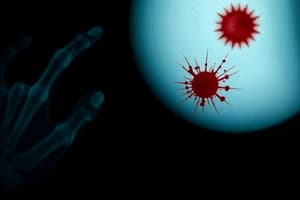Podcast
Questions and Answers
What is a critical factor in determining the method of entrance in robbery cases related to window fragments?
What is a critical factor in determining the method of entrance in robbery cases related to window fragments?
- The type of glass used
- The color of the glass
- The origin of the breakage (correct)
- The size of the fragments
What characteristic of a bullet hole indicates that the shot was fired from the opposite direction?
What characteristic of a bullet hole indicates that the shot was fired from the opposite direction?
- A smooth hole with no damage
- A large and jagged hole
- Even flake distribution around the hole
- Numerous small flakes of glass blown away (correct)
How can one determine if a shot was fired at an angle from the left side of a windowpane?
How can one determine if a shot was fired at an angle from the left side of a windowpane?
- Excessive flaking on the right side of the pane (correct)
- Excessive flaking on the left side of the pane
- No flaking observed
- Equal flaking around the hole
What type of damage does a bullet fired from a long distance typically cause?
What type of damage does a bullet fired from a long distance typically cause?
In analyzing broken windows for criminal cases, what should be done with the glass fragments?
In analyzing broken windows for criminal cases, what should be done with the glass fragments?
What is the result of a shot fired perpendicular to the windowpane?
What is the result of a shot fired perpendicular to the windowpane?
What kind of impression traces may be studied in cases like theft or robbery?
What kind of impression traces may be studied in cases like theft or robbery?
What causes excessive flaking on the left side of a windowpane?
What causes excessive flaking on the left side of a windowpane?
What is the primary origin of soil constituents?
What is the primary origin of soil constituents?
Which mineral is primarily a form of silica and known for being colorless and transparent?
Which mineral is primarily a form of silica and known for being colorless and transparent?
What chemical component is present in calcite?
What chemical component is present in calcite?
What role do clay minerals play in soil?
What role do clay minerals play in soil?
Which of the following is a product of the decomposition of primary minerals?
Which of the following is a product of the decomposition of primary minerals?
Which mineral is also known for its resistant layer structure?
Which mineral is also known for its resistant layer structure?
Organic constituents in soil are primarily formed from what?
Organic constituents in soil are primarily formed from what?
Which of the following is a characteristic of clay soil?
Which of the following is a characteristic of clay soil?
What is a characteristic of cast coins that makes them easily detectable?
What is a characteristic of cast coins that makes them easily detectable?
How are struck coins created?
How are struck coins created?
Which etching fluid is used for aluminum restoration?
Which etching fluid is used for aluminum restoration?
What is the purpose of etching fluid?
What is the purpose of etching fluid?
Which solution is suggested for wrought iron and forged iron?
Which solution is suggested for wrought iron and forged iron?
What percentage of hydrochloric acid is used for tin etching?
What percentage of hydrochloric acid is used for tin etching?
Which metal requires aqua regia for serial number restoration?
Which metal requires aqua regia for serial number restoration?
What factor can vary significantly in soil composition?
What factor can vary significantly in soil composition?
What is a key issue when determining if a person fired a gun?
What is a key issue when determining if a person fired a gun?
What is the primary component percentage of potassium or sodium nitrate in Black Powder?
What is the primary component percentage of potassium or sodium nitrate in Black Powder?
Which type of powder is the most widely used propellant?
Which type of powder is the most widely used propellant?
What constituents are found in Black Powder?
What constituents are found in Black Powder?
What role do stabilizers play in Smokeless Powder?
What role do stabilizers play in Smokeless Powder?
Where could nitrates be expected to be found after the explosion of gunpowder?
Where could nitrates be expected to be found after the explosion of gunpowder?
What happens if there are slight differences in the composition of Black Powder?
What happens if there are slight differences in the composition of Black Powder?
Which stabilizers are sometimes used in Smokeless Powder?
Which stabilizers are sometimes used in Smokeless Powder?
What is a limitation of the diphenylamine - paraffin test?
What is a limitation of the diphenylamine - paraffin test?
Which of the following substances can contain nitrate oxidizing agents?
Which of the following substances can contain nitrate oxidizing agents?
What might cause a person to test positive for nitrates without firing a gun?
What might cause a person to test positive for nitrates without firing a gun?
Which factor is NOT a reason a person might test negative for nitrates despite having fired a gun?
Which factor is NOT a reason a person might test negative for nitrates despite having fired a gun?
What is the maximum timeframe for conducting the diphenylamine - paraffin test after a shooting in the Philippines?
What is the maximum timeframe for conducting the diphenylamine - paraffin test after a shooting in the Philippines?
Why is careful handling of clothing removed from a gunshot victim essential?
Why is careful handling of clothing removed from a gunshot victim essential?
What type of gun is more likely to cause leakage of powder when fired?
What type of gun is more likely to cause leakage of powder when fired?
What can be the effect of wind velocity on nitrate detection after shooting?
What can be the effect of wind velocity on nitrate detection after shooting?
Flashcards are hidden until you start studying
Study Notes
Analysis of Broken Windows
- Examining window fragments in robbery cases plays a vital role in determining whether glass was broken from the inside or outside.
- Analyzing crack patterns and piecing fragments together helps determine the original position of the glass.
Broken Window Caused by Bullet Holes
- Bullet hole edges are sharpest when fired with a strong charge.
- A bullet fired from a long distance will break the pane similarly to a stone.
- A close-range shot produces a crater-like appearance with numerous glass flakes blown away—the bullet was fired from the opposite direction of missing flakes.
- Evenly distributed flakes indicate a perpendicular shot.
- More flake marks on one side indicate an angled shot from the opposite direction.
Broken Window Caused by Fist or Stone
- No details about broken windows caused by fists or stones were found in the text.
Chapter VII
- The chapter focuses on traces left by criminals through impressions such as footprints, tool marks, and tire tracks in cases like theft and robbery.
Cast Coins
- Cast coins are easy to detect due to their pitted and uneven surface, rounded edges, and poor imitations.
Struck Coins
- Struck coins are created by striking or stamping a metal blank through pressure with steel dies, resulting in well-executed impressions.
- They can be difficult to detect as weight, specific gravity, and composition may be similar to genuine coins.
- Careful comparison of smaller details is crucial for identification.
Tampered Serial Numbers
- Etching liquid is often used to restore tampered serial numbers.
- The choice of etching fluid depends on the metal's structure.
Etching Fluids
- Cast iron and cast steel: 10% sulfuric acid and potassium dichromate.
- Wrought iron and forged iron: Solution no. 1 (hydrochloric acid, water, cupric chloride, alcohol) and Solution no. 2 (15% nitric acid).
- Aluminum: Glycerin, nitric acid, and hydrofluoric acid.
- Lead: 3 parts glacial acetic acid and one part water.
- Stainless steel: Dilute sulfuric acid or 10% hydrochloric acid in alcohol.
- Copper, brass, silver, and copper alloys: Ferric chloride, hydrochloric acid, and water.
- Tin: 10% hydrochloric acid.
- Zinc: 10% sodium hydroxide.
- Silver: Concentrated nitric acid.
- Gold and platinum: Aqua regia (3 parts hydrochloric acid and one part nitric acid).
- Wood: Steam jet.
Soil
- Soil originates from the decomposition of rocks and is greatly varied in composition.
- Soil analysis is often overlooked by investigators despite its importance.
- Soil varies significantly even in small geographical areas.
- Soil composition changes with depth.
Constituents of Soil
- Primary minerals: Undecomposed rock fragments, ranging from stone to pebbles, sand, and silt.
- Quartz: A common mineral found in igneous, metamorphic, and sedimentary rocks.
- Calcite (Limestone): White, reacts with acid, releasing carbon dioxide. Abundant in calcareous soil, often found in sedimentary rock.
- Feldspar: A silicate of Aluminum, Sodium, Barium, Calcium, or Potassium.
- Dolomite Limestone: Similar to limestone but is a white mineral extracted from sedimentary rock.
- Mica: A mineral with thin, flexible layers resistant to heat.
- Other primary minerals: Gypsum, Talc, Kaolinite, Limonite, Magnetite
- Clay minerals: Formed by decomposing primary minerals. Found nearly all soils and constitute most heavy soils. Imparts cohesiveness and plasticity, becoming hard and adherent when heated.
- Organic constituents: Highly variable, crucial for soil identification. Agricultural land is rich in organic matter. Peat and muck soils are primarily formed from decaying organic matter.
- Chemical tests: Treating soil samples with hydrochloric acid and ethanol can reveal color changes, gas evolution, and other reactions, aiding in soil identification.
Firearms
- Three key problems arise in firearm investigation.
- Determining whether a person fired a gun with bare hands.
- Establishing the gunshot range.
- Determining the time of firing based on the gun residue.
Gunpowder
- Two main gunpowder types are commonly used:
- Black Powder is an older type with inherent defects
- Smokeless Powder is the most widely used propellant.
- Black Powder is composed of charcoal, sulfur, and potassium or sodium nitrate.
- Smokeless Powder consists of cellulose nitrate, glyceryl nitrate, and stabilizers.
- Stabilizers like nitrates, bichromates, oxalates, Nitrobenzene, Graphite, and Vaseline are added to reduce side reactions.
Possible Locations of Nitrates When Gunpowder Explodes
- Nitrates are found in both gunpowder types and are expected to be found in the following:
- Residue in the barrel of the gun
- In or around bullet wounds
- Clothing of the person fired upon at close range
Limitation of the Diphenylamine - Paraffin Test
- This test is not specific for nitrates; it only detects oxidizing agents.
- Other substances containing nitrates or oxidants, such as fertilizers, explosives, tobacco, firecrackers, urine, cosmetics, and detergents, can produce false positives.
Possibilities of False Positive and False Negative Tests
- A person may test positive for nitrates even without firing a gun due to contact with gunpowder particles from another person.
- A person may test negative for nitrates even after firing a gun due to:
- Direction of the wind
- Wind velocity
- Excessive precipitation
- Wearing gloves
- Using chemicals to remove nitrates
Powder Leakage
- Powder leakage is more likely to occur with old weapons with loose breech mechanisms or revolvers.
Timing of Diphenylamine - Paraffin Tests
- The test should be administered immediately after a shooting incident and not later than 72 hours.
- Nitrates can be detected for up to three days, even after washing hands.
- In the Philippines, the maximum time for conducting the test is two days due to heavy perspiration.
Determining Gunshot Range
- The text has limited information on determining the gunshot range.
Collecting, Preserving, and Packing Clothing
- Clothing should be handled carefully to prevent dislodging powder residues.
- A large area around the bullet entrance should be available for testing.
Studying That Suits You
Use AI to generate personalized quizzes and flashcards to suit your learning preferences.



